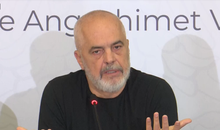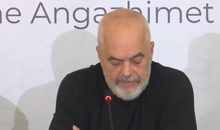
 Flash News
Flash News
The mystery of Renis Dobra's murder, the two main leads of the investigation are revealed
Rama's ultimatum: On Monday, all heads of administrative units must be dismissed
Fires in the country, 4 fires still active, what is the situation?
Rama targets Shkodra prosecutor again: Gjeli wrote philosophical essay with innocence of illegal construction
Wanted for theft, 26-year-old arrested in Durrës

Alfred Lela
The vote on Friday evening on a mini-election package, which paves the way for the Albanian diaspora to vote, erased three conditional decisions against the Parliament of the Constitutional Court.
As always, what is egalitarian does not stand out; traces of inequality always do (its gap sells well). This time, these traces were found in the open/closed lists. The mini-election package concluded a decision of the Constitutional Court that required the opening of the list of MP candidates to the extent of 2/3. At first glance, thanks to the noise, the ratio is reversed: it looks like 2/3 are closed, and the rest are open. It is not so, but such is the noise created, mainly by small political actors, who, in using populism (the people elect all and solve all), hope for two things.
First, to damage the main opposition, the Democratic Party (with the Chairman in prison), and second, to appear as the people's only believers. This is done with the tactical and propagandistic goal of 'the big two are the evil, we are the salvation'. But if you see the striking edge of their discourse, it cuts the opposition and does not bother the government at all.
According to such voices, it is the opposition that betrayed the people; it is the Democratic Party that sold the Electoral Reform, and so on, inaccuracies marinated in malice.
The Democratic Party has been and remains clear in the fight for free elections (without them there is no solution!). It has been and remains clear regarding the OSCE-ODHIR recommendations, where and only where the Electoral Reform should be supported. Which has not happened, has not been done, and apparently will not be done. This is because the majority does not have the will. The proposals of the experts of the Democratic Party have been rejected. Faced with the decisions of the Constitutional Court, the government has accepted only those that were the focus of these decisions.
Under these conditions, the Democratic Party should either not vote for the concerns it has raised - firstly, the vote of the Diaspora - giving the majority a chance to tell the Constitutionalist that it cannot pass them, pointing the finger at the opposition as an obstacle.
In this case, perhaps the same critics will lament the Democratic Party again. The pretext would be there: it is playing the game of the government, which also does not want the vote of the Diaspora.
The second trap they want DP to fall into is the disproportional division of the open/closed list. Taking Tirana as an example, it is said that DP, according to the rule of closed lists in 1/3, will have 12 safe seats. The math of the last time thus allows the Democrats a maximum of 4 seats, starting from the 16 mandates of 2020. There is a crisis of individual and social trust here. The immobile actors, the frozen arena, the pious government. This kind of discourse helps the majority. Detractors of the opposition recognize the government's scandals but not its contraction. They photograph their anti-DP projection, not the state of things, which are shifting, liquid, and have changed.
In the end, what really creates absurdity in this attitude is that the Democratic Party is asked for more than it has and can give. On the other hand, the government is always asked for less than it could and has vast offerings.
Thus, inverted reports and realities create political schizophrenia. Such situations always favor the one with many hands to control things. Those with only one thing in hand, to bring the alarm to the government, do the opposite.
Latest news


Dervish's Irony: Why are 30 advisors few for a water supply director?
2025-07-11 11:58:20



Rama's ultimatum: On Monday, all heads of administrative units must be dismissed
2025-07-11 11:05:59
Fires in the country, 4 fires still active, what is the situation?
2025-07-11 10:56:23
Government irony: Rama strips Dredha of power, then demands law and order
2025-07-11 10:49:10
German media: Vlora Airport 'kills' one of Europe's largest wetlands!
2025-07-11 10:37:46

Amid the Alps in Theth, the law punishes even those who try to respect it
2025-07-11 10:14:16
Wanted for theft, 26-year-old arrested in Durrës
2025-07-11 10:03:29
After the dismissals, Rama gathers the mayors in Durrës
2025-07-11 09:42:29
Released on bail, Salianji appears before the Probation Service
2025-07-11 09:34:28

Haxhi Qamil Rama and the directors of the Municipalities!
2025-07-11 09:21:35
30 years since the Srebrenica massacre in Bosnia and Herzegovina
2025-07-11 09:10:52

From rhetoric to brandy, POLITICO: 9 things Nigel Farage can do in Albania
2025-07-11 08:53:35
Trump announces 35% tariffs on Canadian goods
2025-07-11 08:39:29
Foreign exchange, how much foreign currencies are sold and bought today
2025-07-11 08:24:25

Horoscope, what do the stars have in store for you today?
2025-07-11 07:59:39
Sun and high temperatures, weather forecast
2025-07-11 07:41:09
Morning Post/ In 2 lines: What mattered yesterday in Albania
2025-07-11 07:20:14
Zhupa: In Theth, some Austrian strategic investors want the empty area
2025-07-10 22:57:08
Malltezi: SPAK admits, we are in a process that began with Balla's false report
2025-07-10 22:34:16

Si të çliroheni nga bllokimet emocionale me anë të ushtrimeve
2025-07-10 21:57:24

Lala: Veliaj wanted to return as mayor
2025-07-10 21:40:46

VIDEO/ Brawl in Bolivian parliament, deputies physically clash
2025-07-10 21:20:30


Albania experienced one of the longest heat waves of the last decade
2025-07-10 21:01:09

The Government approves new procedures for declaring residence in e-Albania
2025-07-10 20:39:32

Koka: Northerners will not forget Edi Rama's racist operation in Theth
2025-07-10 20:18:24
The 3 zodiac signs that will be most affected by the 'Full Moon' of July 10
2025-07-10 20:04:49
New director of the National Center of Cinematography appointed
2025-07-10 19:51:12
Korça/ 40-year-old man jumps from fifth floor balcony, in critical condition
2025-07-10 19:40:19
'Tired Woman'/ The Syndrome That Affects Thousands of Women Every Day
2025-07-10 19:34:02
Jane Birkin's original Hermès bag sells for $10 million
2025-07-10 19:26:22

Britain-Ukraine agreement signed for 5,000 Thales missiles
2025-07-10 19:00:25
Fire in Zvërnec, flames endanger two hotels
2025-07-10 18:57:19
Croatia restores compulsory military service
2025-07-10 18:39:01
Spahia: The great truth of the strong accusation of the residents of Theth
2025-07-10 18:35:07


The Supreme Court left him in prison, Meta addresses the 'Constitution'
2025-07-10 17:57:21
New punishment with 'new' regulations
2025-07-10 17:54:46
EU translator fired over fears for Zelenskyy's safety
2025-07-10 17:45:37
'You are a policeman, but not God, take my soul', protest for Agon Zejnullahu
2025-07-10 17:41:21


Video/ Rama repeats the scenario, kneels before Meloni again
2025-07-10 16:56:31
He set fire to a plot of olive trees, 50-year-old man arrested in Shijak
2025-07-10 16:46:19

Rubio: US and Russia have exchanged new ideas for Ukraine peace talks
2025-07-10 16:36:20
Death of 27-year-old, Lipjan Police Commander Resigns
2025-07-10 16:21:28
Video/ An apartment burns in Tirana near the New Bazaar
2025-07-10 16:09:36


Jensila lights up the internet with her birthday greetings to Ledri
2025-07-10 15:42:08
They're full of pesticides! List of 12 products we need to be careful of
2025-07-10 15:31:04

Worker falls from scaffolding in Shëngjin, urgently sent to Trauma
2025-07-10 15:11:03
Malltezi: Within one day they seized my accounts, properties and shares
2025-07-10 15:01:23
EU: Israel has agreed to more aid to Gaza
2025-07-10 14:55:19


Murder of Reni Dobra, 23-year-old's vehicle pulled from the water
2025-07-10 14:29:23
Trump's tariffs on Brazil raise coffee prices
2025-07-10 14:16:07
Ursula von der Leyen survives no-confidence vote
2025-07-10 14:04:27


Fire in Lezha, flames near electrical substation
2025-07-10 13:32:24
Residents clash with police in Theth, a woman faints
2025-07-10 13:24:38
"Rama and Xanun"
2025-07-10 13:15:46

Zodiac signs most likely to get divorced in July 2025
2025-07-10 12:45:51
A scapegoat for an illegitimate Republic
2025-07-10 12:35:02
"He has devastated his own nation"/ Berisha: Rama imprisons his opponents!
2025-07-10 12:26:54

Albanian man injured with knife in Italy
2025-07-10 12:08:55






23-year-old in Mat drowned with rope, 4 suspects are being held
2025-07-10 10:58:53

After the dismissals, the new director of the Shkodra Police is appointed
2025-07-10 10:30:10
BIRN: Rama's action for public spaces, a repeated spectacle
2025-07-10 10:29:11
Action in Theth, Shkodra Police leaders dismissed
2025-07-10 10:16:28
